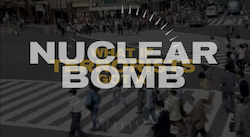Four Statesmen Documentary Highlights the Dangers of Nuclear Weapons
January 27, 2010
Featured Image
We are happy to serve you a daily summary of the day's top nuclear policy stories each morning, with excerpts from the stories in bullet form.
Stories we're following today:
Documentary Advances Nuclear Free Movement - NPR Morning Edition [link]
- The documentary Nuclear Tipping Point features interviews with four former U.S. government officials — all dedicated Cold War warriors when they were in office — who now advocate the elimination of nuclear weapons.
- Three years ago, Henry Kissinger, George Shultz, Sam Nunn and William Perry wrote an op-ed arguing that it is time to begin ridding the world of nuclear weapons. That sparked a movement, and producers hope the film can take it further.
- Listen to the NPR interview with the four statesmen below:
- Visit the Nuclear Tipping Point website for more information or to order a free DVD, and watch the trailer below:
Making the Nuclear Security Summit Matter: An Agenda for Action - Kenneth Luongo in Arms Control Today [link]
- The April nuclear security summit that President Barack Obama will host in Washington will be an unprecedented event. More than 40 heads of state from the developed and developing world will gather to discuss the need to prevent nuclear terrorism and secure all vulnerable nuclear materials in four years.
- To avoid the possibility that the summit could be long on hype and short on action, the event should be viewed as a three-phase process, with objectives clearly defined for each stage.
- The lead-up to the summit should be used to generate new international commitments to secure nuclear and radiological materials worldwide and to increase the capacity of national governments and international institutions to address these challenges.
- The summit itself, which will take place April 12-13, should culminate in the approval of specific, time-bound goals and actions by the represented governments.
- The postsummit period should include regular technical meetings to discuss implementation of the commitments and additional steps that should be taken as circumstances evolve.
Health Care, Massachusetts, and Nukes - Max Bergmann in the Wonk Room [link]
- Health care and nuclear proliferation seem to have little to do with each other. But right now the President’s ambitious nuclear non-proliferation agenda – the issue for which he received the Nobel Prize – is hanging in the balance.
- Should congress fall into a state of paralysis or drastically scale back its ambition; should the health care bill get broken up and therefore eat up more of the legislative calendar; should Republican Senators continue to utilize the politics of obstruction with no political cost; and should Democrats cower in the face of this opposition – the President’s nuclear agenda, along with many other progressive priorities, will be in deep trouble.
- Should Senate Republicans conclude that continuing to pursue a politics of obstruction and therefore blocking these critical treaties will have little if any political cost – and would alternatively offer some political gain by hurting the President – they will go nowhere and as a result so will the President’s nuclear agenda.
Sanctions on Iran May Come in February, Merkel Says - Xinhua [link]
- February was a crucial month for United Nations in pushing toward sanctions on Iran for its controversial nuclear program, German Chancellor Angela Merkel said Tuesday, after talking with visiting Israeli President Shimon Peres.
- "The issue of sanctions on Iran will be on the agenda when France has the chair of the UN Security Council," Merkel said at a joint press conference with Peres after their meeting. "I think February will be the crucial month."
- On Monday, the chancellor warned that "time is running out" for Iran to give nod to inspections from the international community, and "it would be a tragedy for the people of Iran" if their government rejected cooperation.
Turning the Doomsday Clock - Katie Mounts in The Register Citizen [link]
- In turning back the clock, the scientists recognized the significant progress made in the past year toward reducing the dangers posed by nuclear weapons.
- Twenty-first century threats require innovative and global solutions. Reducing the numbers of nuclear weapons in the world and preventing their further spread will require concerted effort by many nations and sustained leadership from the United States.
- Finalizing a treaty to succeed START is an important first step, but it is just that—a first step. 11:54 p.m. is still too late if the world ends at midnight.



